Filters: Department: "Chemical Engineering" Format: "application/pdf" School Or College: "College of Engineering" Collection: "ir_uspace"
| Creator | Title | Description | Subject | Date | ||
|---|---|---|---|---|---|---|
| 1 |
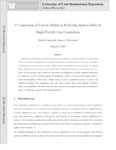 | Sutherland, James Clayton | A comparison of various models in predicting ignition delay in single-particle coal combustion | In this paper, individual coal particle combustion under laminar conditions is simulated using models with various levels of complexity for the particle and gas phase chemical kinetics. The mass, momentum and energy governing equations are fully coupled between the particle and the gas phase. In the... | 2014-01-01 | |
| 2 |
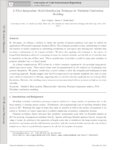 | Sutherland, James Clayton | A filter-independent model identification technique for turbulent combustion modeling | In this paper, we address a method to reduce the number of species equations that must be solved via application of Principal Component Analysis (PCA). This technique provides a robust methodology to reduce the number of species equations by identifying correlations in state-space and defining new v... | 2012-01-01 | |
| 3 |
 | Whitty, Kevin J. | A pulse-width modulation controlled wire-mesh heater apparatus for investigation of solid fuel pyrolysis | A novel wire mesh heater apparatus has been developed to study the devolatilization of solid fuels under pressurized conditions at well-controlled heating rates on the order of 1000 K/s. The apparatus combines direct current and pulse-width modulation with a fast-acting and high current-capacity re... | 2012-01-01 | |
| 4 |
 | Whitty, Kevin J. | A system for measuring bubble voidage and frequency around tubes immersed in a fluidized bed of particles | Gas-solid fluidized beds are common in chemical processing and energy production industries. These types of reactors frequently have banks of tubes immersed within the bed to provide heating or cooling, and it is important that the fluid dynamics within these bundles is efficient and uniform. This p... | 2010 | |
| 5 |
 | Sutherland, James Clayton; Kerstein, Alan R. | A unified approach to the various formulations of the one-dimensional-turbulence model | The One-Dimensional Turbulence (ODT) model has been successfully applied as a stand-alone model for predicting turbulence statistics in both nonreacting and reacting flows. There are several formulations of the model in the literature, and most of the variable-density formulations do not clearly dis... | 2010 | |
| 6 |
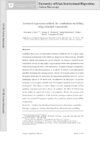 | Sutherland, James Clayton | Advanced regression methods for combustion modelling using principal components | Modelling the physics of combustion remains a challenge due to a large range of temporal and physical scales which are important in these systems. Detailed chemical kinetic mechanisms are used to describe the chemistry involved in the combustion process yielding highly coupled partial differential e... | 2014-01-01 | |
| 7 |
 | Sutherland, James Clayton; Kerstein, Alan R.; Chen, Jaqueline H. | An evaluation of the one-dimensional turbulence model: comparison with direct numerical simulation of CO/H2 jets with extinction and reignition | Abstract A variant of the One-Dimensional Turbulence (ODT) model formulated in an Eulerian reference frame is applied to a planar nonpre mixed turbulent jet flame and results from the model prediction are compared with DNS data. The model employed herein solves the full set of conservation equation... | 2010 | |
| 8 |
 | Pershing, David W. | Bench and pilot scale process evaluation of reburning for in-furnace NOx reduction | This paper describes a combined experimental and theoretical study which was undertaken to quantify the impact of fuel and process parameters on reburning effectiveness and provide the scaling information required for commercial application of reburning under highly varied industrial conditions. Ini... | Reburning; Nitrogen oxides reduction; Staged fuel injection | 1986 |
| 9 |
 | Pershing, David W. | Biomass combustion: relationship between pollutant formation and fuel composition | A 65-kW refractory-walled reactor was used to study biomass combustion under conditions typical of the suspension-burning phase in a spreader-stoker-fired boiler. Isothermal combustion data and nitric oxide (NO) emission rates were obtained as a function of temperature, local oxygen concentration, ... | Combustion; Emissions; Energy; Environmental control; Fuels; Pyrolysis; Biomass fuel; Particulates | 1989 |
| 10 |
 | Lighty, Joann; Sarofim, Adel F. | Carbon dioxide effects on metal vaporization during coal combustion | Coal combustion products may take one of two forms. Residual ash (> 1 micron) is formed by particle shrinkage and breaking during combustion. Some material will vaporize and later recondense. During recondensation, these molecules have a high affinity for submicron particles because of the large sur... | Coal combustion products; Metal vaporization; Carbon dioxide; Residual ash | 2001 |
| 11 |
 | Pershing, David W. | Control of NOx and particulate emissions from spreader-stokers fired with hogged wood | The formation and emission of nitrogen oxides and particulate carry-over were studied from spreader-stoker combustion of hogged Douglas-fir, with a focus on optimizing the combustion conditions in each of the two distinct combustion zones, the bed phase and the suspension phase local oxygen availabi... | Chemical analysis; Combustion; Emission; Engineering; Environmental control; Fuels; Nitrogen compounds; Particulates; NOx; Hogged wood | 1987 |
| 12 |
 | Pershing, David W. | Control of NOx emissions | NITROGEN OXIDES (NOX) are produced in combustion from molecular nitrogen (thermal NOx) or from oxidation of nitrogen contained in the fuel (fuel NOx). Production of NOx in a turbulent diffusion flame is largely dependent upon fuel composition and fuel/air contacting, which for liquid fuels is determ... | Staged heat release; Tunnel furnace; Boiler simulator; Staged combustion | 1980 |
| 13 |
 | Pershing, David W. | Design and construction of a rotary kiln simulator for use in studying the incineration of hazardous waste | Rotary kilns have been used extensively in the cement industry to calcine limestone. In the past few years, the technology has been viewed as a possible option for the incineration of hazardous waste materials, especially for the disposal of solid wastes and the cleanup of contaminated soils and tra... | Rotary kilns; Hazardous waste; Waste burning | 1989-08 |
| 14 |
 | Ring, Terry Arthur; Eddings, Eric G.; Sarofim, Adel F. | Determination of soot refractive index as a function of height in an inverse diffusion flame | With the scope of combustion diagnostics increasing, it is becoming ever more important for some of the more basic physical properties of soot to be addressed. Soot refractive index values were obtained as a function of height in a benzene inverse diffusion flame (IDF). The IDF was chosen for ease i... | Inverse diffusion flame | 2007 |
| 15 |
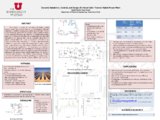 | Rashid, Khalid; Powell, Kody | Dynamic simulation, control, and design of a novel solar thermal hybrid power plant | Solar power is among the promising technologies leading towards cleaner fuel. However, there are still technological challenges regarding the reliability of power generation due to its intermittency. This work demonstrates the synergies that exist in integrated hybrid systems, where a dispatchable f... | Solar energy--Research; Solar thermal energy--Research; Solar power plants--Research | 2017 |
| 16 |
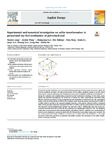 | Eddings, Eric G. | Experimental and numerical investigation on sulfur transformation in T pressurized oxy-fuel combustion of pulverized coal | Pressurized oxy-fuel combustion, as a novel and promising technology for CO2 capture from power plants, has attracted worldwide attentions. The high partial pressure of CO2 induces significant changes to the SOx release characteristic. Properly addressing these fundamental issues and technological c... | Pressurized; Oxy-fuel combustion; SO2 emission; Numerical; Pulverized coal | 2019 |
| 17 |
 | Eddings, Eric G.; Sarofim, Adel F. | Experimental study of burning rate in jet-fuel pool fires | Experiments were carried out in a 30 cm diameter pool fire, for both transient and steady-state conditions, utilizing jet fuel, Norpar-15, and a surrogate mixture of hydrocarbons that simulates jet-fuel behavior in a pool fire. Steady state pool fire tests match previous results well. The transient ... | Pool fires; Jet propulsion fuel; Norpar-15 | 2004 |
| 18 |
 | Eddings, Eric G.; Sarofim, Adel F. | Fast cook-off tests report | The Center for the Simulation of Accidental Fires and Explosions (C-SAFE) at the University of Utah is focused on providing science-based tools for the numerical simulation of accident scenarios involving fires and high-energy devices (Pershing, 2000). The initial computational efforts are concentra... | Heat flux; Heat transfer; Cookoff tests; Center for the Simulation of Accidental Fires and Explosions; C-SAFE | 2003 |
| 19 |
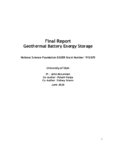 | McLennan, John | Final Report Geothermal Battery Energy Storage | Solar and wind power are being introduced into electric grids to supplement and replace conventional electricity production. The deployment of utility-scale storage has not kept pace to overcome the intermittent nature of solar and to a lesser extent wind. Large-scale energy storage is cur... | 2020-06 | |
| 20 |
 | Pershing, David W. | Formation and control of NO emissions from coal-fired spreader-stoker boilers | Stoker coal-fired furnaces are significant in terms of coal consumption and environmental impact; however, they have received little research attention. This paper describes the results of a study on the formation and control of nitrogen oxides in coal-fired spreader-stoker systems. Three scales of... | Stoker coal-fired furnaces | 1983 |
| 21 |
 | Lighty, Joann; Silcox, Geoffrey | Fundamentals of mercury oxidation in flue gas | This report was prepared as an account of work sponsored by an agency of the United States Government. Neither the United States Government nor any agency thereof, nor any of their employees, makes any warranty, express or implied, or assumes any legal liability or responsibility for the accuracy, ... | 2006 | |
| 22 |
 | McLennan, John | Geothermal Battery Surface Facilities Economics and Finance as an O&G play | |||
| 23 |
 | Ring, Terry Arthur | Growth kinetics of hexagonal sub-micrometric β-tricalcium phosphate particles in ethylene glycol | Recently, uniform, non-agglomerated, hexagonal b-tricalcium phosphate (b-TCP) platelets (diameter 400-1700 nm, h 100-200 nm) were obtained at fairly moderate temperatures (90-170 C) by precipitation in ethylene glycol. Unfortunately, the platelet aspect ratios (diameter/thickness) obtained in the ... | 2014-01-01 | |
| 24 |
 | Stringfellow, Gerald B.; Shurtleff, James Kevin | Heterostructures in GaInP grown using a change in Te doping | In organometallic vapor phase epitaxy, changes in growth conditions can be used to modulate the extent of CuPt ordering and, hence, the band gap energy of GaInP. One method is to add Te during growth. An increase in the band gap energy of 0.1 eV due to a decrease in ordering has been obtained by ... | Heterostructures; Alloys | 2000 |
| 25 |
 | Pershing, David W. | Influence of coal composition on the fate of volatile and char nitrogen during combustion | Fifty coals from North America, Europe, Asia, South Africa and Australia were burned in a 21 kW, refractory-lined tunnel furnace to determine the influence of coal properties on the fate of volatile and char nitrogen. Excess air fuel NO emissions (as determined by combustion in Ar/02/C02) ranged fro... | Coal composition; Char nitrogen; Volatile nitrogen; NO emissions | 1982 |
